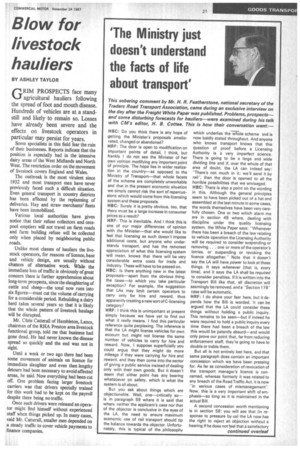'The Ministry just doesn't understand the facts of life about transport'
Page 23

If you've noticed an error in this article please click here to report it so we can fix it.
This sobering comment by Mr. H. R. Featherstone,. national secretary of the Traders Road Transport Association, came during an exclusive interview on the day after the Freight White Paper was published. Problems, prospects— and some disturbing forecasts for hauliers—were examined during his talk with CM's editor, H. B. Cottee. This is how their conversation went: HBC: Do you think there is any hope of getting the Minister's proposals ameliorated, changed or abandoned?
HRF: The door is open to modification on important points of detail. I think, but frankly I do not see the Minister of her own volition modifying any important point of principle, The hope lies in wider realization in the country—as opposed to the Ministry of Transport—that whole facets of the scheme are completely unworkable and that in the present economic situation we simply cannot risk the sort of repercussions which would come from this licensing system and these proposals.
HBC: Surely it is pretty obvious, too, that there must be a large increase in consumer prices as a result?
HRF: This is inevitable. And I think this is one of our major differences of opinion with the Minister—that she would like to feel that licensing as such doesn't impose additional costs, but anyone who understands transport, and has the remotest appreciation of what this licensing system will mean, knows that there will be very considerable extra costs for trade and industry. These will have to be passed on. HBC: Is there anything new in the latest proposals—apart from the obvious thing, the taxes—to which you take particular exception? For example, the suggestion that LAs may limit certain operators to carry only for hire and reward, thus apparently creating a new sort of C-licensing category?
HRF: I think this is unimportant at present simply because we have yet to find out what it really means. I find this particular reference quite perplexing. The inference is that the LA might license vehicles for own account but might not license the same number of vehicles to carry for hire and reward. Now. I suppose superficially you could argue that they might do more mileage if they were carrying for hire and reward, and they then come into the sector of giving a public service instead of dealing only with their own goods. But it doesn't seem that either point has any bearing whatsoever on safety, which is what the system is all about.
But you ask about things which are objectionable. Well, one—critically so— is in paragraph 59 where it is said that where neither the applicant's case nor that of the objector is conclusive in the eyes of the LA, the need to ensure maximum economic use of rail transport should tip the balance towards the objector. Unfortunately, this is typical of the philosophy
which underlies the whole scheme 3nd is now baldly stated throughout. And anyone
who knows transport knows that this question of proof before a Licensing Authority is a very imperfect science.
There is going to be a large and wide dividing line and if, over the whole of that area of doubt, the LA can indeed say: "There's not much in it; we'll send it by rail", then the door is opened to all the horrible possibilities that we envisaged.
HBC: There is also a point on the wording in this. Although the general principles seem to have been picked out of a hat and assembled at the last minute in some cases, the words themselves have been very care fully chosen. One or two which alarm me are in section 49 where, dealing with discipline under the quality licensing system, the White Paper says: "Whenever there has been a breach of the law relating to vehicle operation the Licensing Authority will be required to consider suspending or removing . . . one or more of the operator's lorries, or suspending or revoking the licence altogether." Note that it doesn't say the LA will have power to look at these things. It says whenever (that is. every time), and it says the LA shall be required to consider penalties. If it is written into the Transport Bill like that, all discretion will seemingly be removed, and a "Section 178" case will be automatic.
HRF: I do share your fear here, but it depends how the Bill is worded. It can be argued that the LA could consider these things without holding a public inquiry. This remains to be seen—but if indeed he were required to hold a public inquiry every time there had been a breach of the law this would be patently absurd—and would only prove our point that, far from reducing enforcement staff, they're going to have to double or treble them.
But all is not entirely lost here, and that same paragraph does contain an important concession which we have been pressing for. As far as consideration of revocation of the transport manager's licence is con cerned, whereas formerly it was related to any breach of the Road Traffic Act, it is now "in serious cases of mismanagement".
Now, this is a very important shift of emphasis—so long as it is maintained in the actual Bill.
A second concession worth mentioning is in section 58; you will see that (in re sponse to pressure by us) the LA now has the right to reject an objection without a hearing if he does not feel that a satisfactory continued overleaf












































































































































